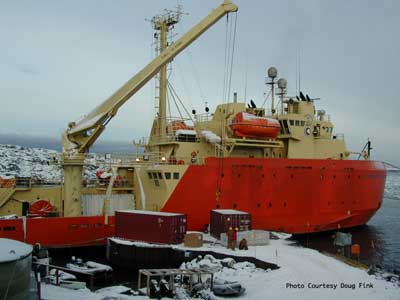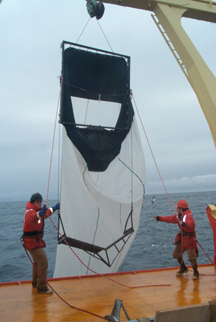Scientists and students in the Palmer, Antarctica Long Term Ecological Research Project (PAL-LTER) aboard the Antarctic Research and Supply Vessel (ARSV) Laurence M Gould has named one of their study sites "Ocean Station Obama" in celebration of the US Presidential inauguration. The science team was conducting an oceanographic process study January 19-21 in the Marguerite Bay area immediately south of Adelaide Island in the eastern Bellingshausen Sea (~67 deg 46 S, 68 deg 51 W), right in the middle of the inaugural events.

The LM Gould, where LTER scientists celebrated the Presidential Inauguration by naming "Ocean Station Obama" (photo by Doug Fink).
Members of the Expedition team were hopeful that their mode of celebration would bring ocean sciences and climate change research the public attention it deserves. The scientists believe that their study area, located 10,000 miles from Washington DC in an area of rapidly changing climate and ecology, sits in the right spot and moment in history to dedicate the sampling station to the inauguration on Tuesday, January 20, 2009.
The three-day study was part of the 17th annual PAL-LTER 7-week oceanographic expedition. Since 1993, these cruises in the Austral summer have surveyed a 200 x 500 km study region along the western Antarctic Peninsula. Their overall objective is to understand the geophysical and ecological relations among climate, sea ice and the marine pelagic ecosystem in the region. The western Antarctic Peninsula has warmed in winter by 66ºC since 1950, causing a 90-day reduction in sea ice cover since 1978. The marine ecosystem is responding at all levels of the food chain from phytoplankton to penguins and seals.

Marine Technician Chance Miller (right) and zooplankton team member Kate Ruck (left) deploy the zooplankton net (photo by D. Steinberg).
Individual locations where samples are conducted are referred to as oceanographic stations. Oceanographers name such stations to facilitate future identification. During Ocean Station Obama, PAL-LTER conducted a special process study with two objectives: 1) to characterize physical/biological processes related to Adelie penguin foraging in the area, and 2) to investigate processes resulting in storage of atmospheric CO2 in the water column as organic carbon produced through marine biological activity (the Biological Pump).
Over the three days scientists carried out repeated sampling with electronic water samplers, zooplankton nets, submersible pumps and optical sensors. The ship followed a freely-drifting array, collecting particles that settled through the water column. They also deployed an undersea glider equipped with oceanographic sensors to profile the study region in greater detail.
The study area in the southern part of the PAL-LTER survey region has been the focus of repeated studies since the mid-1990’s. In particular, the Adelie penguin colony on Avian Island has been studied for comparison with the one near Palmer Station that has declined by 80% since 1975 in response to climate warming. PAL scientists hypothesize from comparison of their north (Palmer Station) and south (Avian Island) sites that the regional climate warming is migrating from north to south along the Peninsula.
PAL-LTER is part of the US Long Term Ecological Research Network. The PAL-LTER and ARSV LM GOULD are supported by grants from the Antarctic Organisms and Ecosystems Program, National Science Foundation Office of Polar Programs. Logistics support is provided by Raytheon Polar Services Corp. The LM GOULD is owned and operated by Edison Chouest Offshore.
Please visit the PAL-LTER Cruise Website for more information and exciting pictures of the research activities referred to in this story.
Below is a sample of the media's take on the story:
Antarctic climate researchers hold distant inaugural celebration
In what may well be the furthest-flung celebration of Barack Obama's inauguration, scientists aboard the U.S. research vessel Laurence M Gould held a commemoration 10,000 miles from Washington D.C. off Antarctica.
The researchers, who are spending three days at sea examining signs of climate change, decided to call the temporary study area they have established "Ocean Station Obama."
Doug Martinson, an oceanographer at Columbia University's Lamont-Doherty Earth Observatory and the cruise's chief scientist, said they named the station after the 44th president and his incoming administration "to recognize their vital interest in the problem of climate change."
"The setting of our study, in an area of rapidly changing climate and ecology, is an appropriate spot and moment in our history to dedicate this sampling station to the events taking place in Washington," Martinson said in a statement. "In doing so, we hope to bring ocean sciences and climate change research to the public's attention."
The three-day cruise is a part of a seven-week oceanographic expedition known as the Palmer, Antarctica Long-Term Ecological Research Project (PAL-LTER), which has surveyed a section of the western Antarctic Peninsula each year since 1993.
The peninsula has warmed nearly 11 degrees Fahrenheit since 1950, leaving the area with 90 fewer days of sea ice cover compared to 1978. The warming has particularly hurt an Adelie penguin colony near Palmer Station, which has declined by 80 percent since 1975.
By Juliet Eilperin
This story is sourced unedited from the Washington Post blogs, Jan. 20, 2009 (http://voices.washingtonpost.com/44/)
More stories...
Story on Lamont-Doherty scientist Doug Martinson and others celebrating Presidential Inaugural by doing climate research at sea
Obama, Antarctica - January 20, 2009
Nature blogs, Jan. 20, 2009
(http://blogs.nature.com/news/thegreatbeyond/2009/01/obama_antarctica.html)
Obama Administration Off to Chilly Start
Fox News, Jan 20, 2009
Climate scientists at sea celebrate inauguration by declaring Ocean Station Obama (http://www.foxnews.com/politics/first100days/2009/01/20/obama-administration-chilly-start/)
